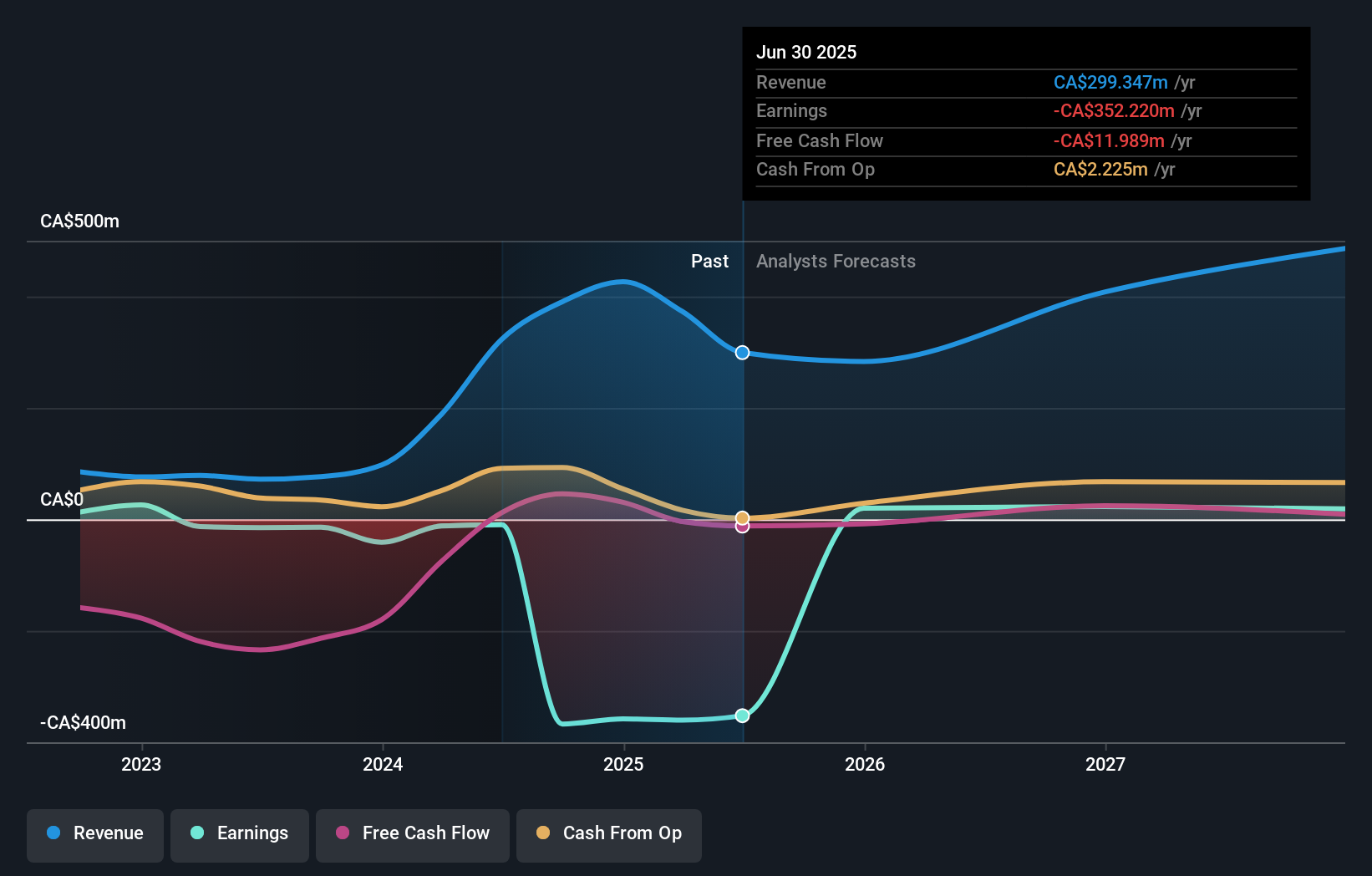- Canada
- /
- Oil and Gas
- /
- TSX:LCFS
Public companies among Tidewater Renewables Ltd.'s (TSE:LCFS) largest shareholders, saw gain in holdings value after stock jumped 10% last week
Key Insights
- Significant control over Tidewater Renewables by public companies implies that the general public has more power to influence management and governance-related decisions
- 66% of the company is held by a single shareholder (Tidewater Midstream and Infrastructure Ltd.)
- Analyst forecasts along with ownership data serve to give a strong idea about prospects for a business
Every investor in Tidewater Renewables Ltd. (TSE:LCFS) should be aware of the most powerful shareholder groups. We can see that public companies own the lion's share in the company with 66% ownership. In other words, the group stands to gain the most (or lose the most) from their investment into the company.
As a result, public companies collectively scored the highest last week as the company hit CA$178m market cap following a 10% gain in the stock.
In the chart below, we zoom in on the different ownership groups of Tidewater Renewables.
Check out our latest analysis for Tidewater Renewables

What Does The Institutional Ownership Tell Us About Tidewater Renewables?
Many institutions measure their performance against an index that approximates the local market. So they usually pay more attention to companies that are included in major indices.
We can see that Tidewater Renewables does have institutional investors; and they hold a good portion of the company's stock. This can indicate that the company has a certain degree of credibility in the investment community. However, it is best to be wary of relying on the supposed validation that comes with institutional investors. They too, get it wrong sometimes. It is not uncommon to see a big share price drop if two large institutional investors try to sell out of a stock at the same time. So it is worth checking the past earnings trajectory of Tidewater Renewables, (below). Of course, keep in mind that there are other factors to consider, too.

We note that hedge funds don't have a meaningful investment in Tidewater Renewables. Tidewater Midstream and Infrastructure Ltd. is currently the company's largest shareholder with 66% of shares outstanding. With such a huge stake in the ownership, we infer that they have significant control of the future of the company. In comparison, the second and third largest shareholders hold about 4.0% and 2.2% of the stock.
Researching institutional ownership is a good way to gauge and filter a stock's expected performance. The same can be achieved by studying analyst sentiments. There are a reasonable number of analysts covering the stock, so it might be useful to find out their aggregate view on the future.
Insider Ownership Of Tidewater Renewables
While the precise definition of an insider can be subjective, almost everyone considers board members to be insiders. Company management run the business, but the CEO will answer to the board, even if he or she is a member of it.
Insider ownership is positive when it signals leadership are thinking like the true owners of the company. However, high insider ownership can also give immense power to a small group within the company. This can be negative in some circumstances.
Our most recent data indicates that insiders own less than 1% of Tidewater Renewables Ltd.. It has a market capitalization of just CA$178m, and the board has only CA$11k worth of shares in their own names. Many investors in smaller companies prefer to see the board more heavily invested. You can click here to see if those insiders have been buying or selling.
General Public Ownership
The general public-- including retail investors -- own 28% stake in the company, and hence can't easily be ignored. While this size of ownership may not be enough to sway a policy decision in their favour, they can still make a collective impact on company policies.
Public Company Ownership
It appears to us that public companies own 66% of Tidewater Renewables. This may be a strategic interest and the two companies may have related business interests. It could be that they have de-merged. This holding is probably worth investigating further.
Next Steps:
While it is well worth considering the different groups that own a company, there are other factors that are even more important. Take risks for example - Tidewater Renewables has 1 warning sign we think you should be aware of.
If you would prefer discover what analysts are predicting in terms of future growth, do not miss this free report on analyst forecasts.
NB: Figures in this article are calculated using data from the last twelve months, which refer to the 12-month period ending on the last date of the month the financial statement is dated. This may not be consistent with full year annual report figures.
Valuation is complex, but we're here to simplify it.
Discover if Tidewater Renewables might be undervalued or overvalued with our detailed analysis, featuring fair value estimates, potential risks, dividends, insider trades, and its financial condition.
Access Free AnalysisHave feedback on this article? Concerned about the content? Get in touch with us directly. Alternatively, email editorial-team (at) simplywallst.com.
This article by Simply Wall St is general in nature. We provide commentary based on historical data and analyst forecasts only using an unbiased methodology and our articles are not intended to be financial advice. It does not constitute a recommendation to buy or sell any stock, and does not take account of your objectives, or your financial situation. We aim to bring you long-term focused analysis driven by fundamental data. Note that our analysis may not factor in the latest price-sensitive company announcements or qualitative material. Simply Wall St has no position in any stocks mentioned.
About TSX:LCFS
Tidewater Renewables
Engages in production of renewable fuel in North America.
High growth potential and fair value.
Market Insights
Community Narratives


